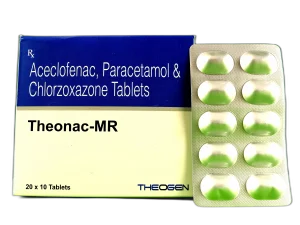◉Aceclofenac is a nonsteroidal anti-inflammatory drug (NSAID) used to relieve pain and inflammation in conditions such as osteoarthritis, rheumatoid arthritis, ankylosing spondylitis, and menstrual pain. Each tablet of Aceclofenac 200 mg contains 200 mg of the active ingredient Aceclofenac.
◉ Aceclofenac works by reducing the production of chemicals called prostaglandins in the body, which cause pain, inflammation, and fever. By inhibiting this production, Aceclofenac helps to reduce pain and inflammation in affected areas.
◉ Aceclofenac 200 mg tablets are typically taken orally, with or without food, and should be swallowed whole with a glass of water. The recommended dose for adults is usually one tablet twice a day, although this may vary depending on the severity of the condition being treated and the individual’s response to treatment. It is important to take Aceclofenac only as prescribed by a healthcare provider and to avoid exceeding the recommended dose.
◉ Common side effects of Aceclofenac may include stomach upset, nausea, vomiting, indigestion, headache, dizziness, and rash. If you experience any unusual symptoms or side effects while taking Aceclofenac, it is important to speak with your healthcare provider right away.
Composition of Drug
◉This drug contain Aceclofenac 200 mg
How does the Drug work
◉Aceclofenac is a non-steroidal anti-inflammatory drug (NSAID) that works by reducing inflammation, swelling, and pain in the body. It belongs to the group of NSAIDs called selective COX-2 inhibitors, which selectively inhibit the activity of the COX-2 enzyme, an enzyme responsible for the production of prostaglandins that cause inflammation and pain.
◉ Aceclofenac works by blocking the action of COX-2, thereby reducing the production of prostaglandins and other inflammatory substances. This leads to a decrease in pain, inflammation, and swelling in the affected areas of the body.
◉ Aceclofenac is commonly used to treat various types of pain and inflammation, including rheumatoid arthritis, osteoarthritis, ankylosing spondylitis, and dental pain. However, it is important to note that like all NSAIDs, aceclofenac may have side effects, particularly on the gastrointestinal system, and should be used only under the guidance of a healthcare professional.





